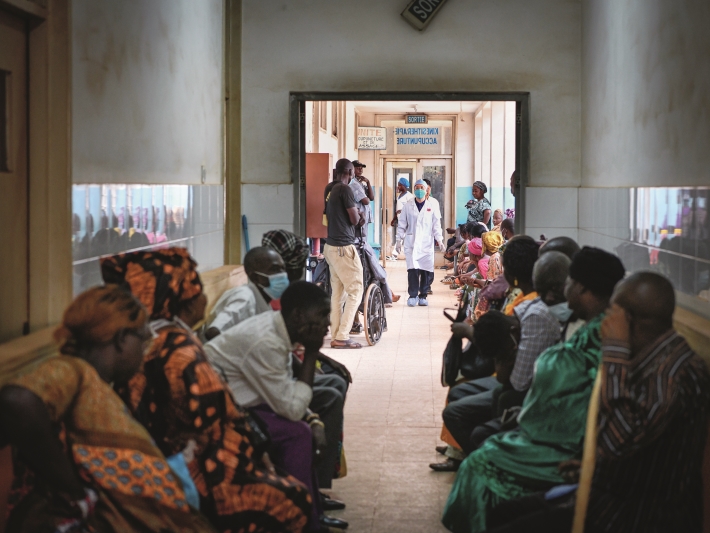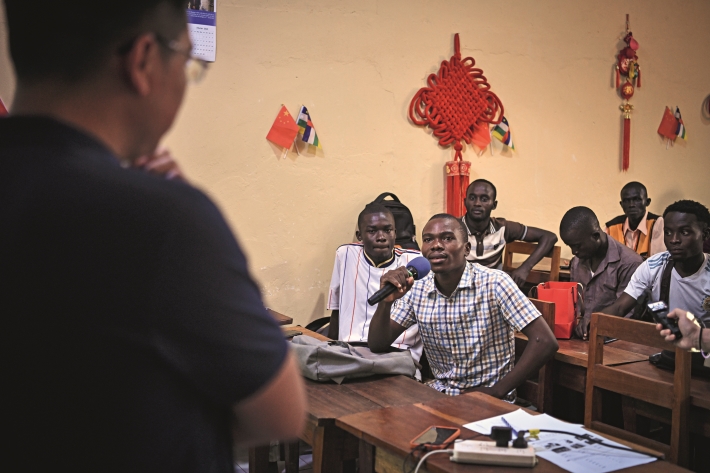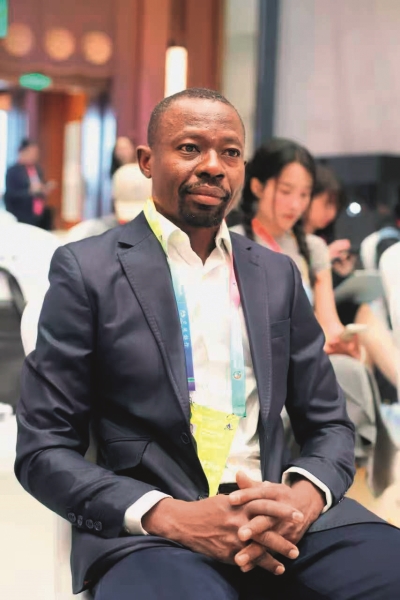|
||||||||||
| Home Top News Economy/Tech Culture/Sports China in Foreign Eyes Green Development Videos Intangible Cultural Heritages |
|
||||||||||
| Home Top News Economy/Tech Culture/Sports China in Foreign Eyes Green Development Videos Intangible Cultural Heritages |
| ChinAfrica |
| In the Heart of Peace |
| Local initiatives, responsible media, and strategic partnerships are key to stability in the Central African Republic |
| ChinAfrica | VOL. 17 September 2025 ·2025-09-01 |

Patients await care at the Hospital of Friendship in Bangui, Central African Republic, on 5 February 2024 (XINHUA)
Against the backdrop of persistent security problems and external interference, many people in the Central African Republic are calling for solutions rooted in the country’s own realities. In this interview, Bienvenu Paya-Ngbouhou, editor in chief of the newspaper L’Hirondelle, reflects on the need to understand the nation’s internal dynamics, the role of the press in peacebuilding, and opportunities for cooperation with partners such as China.
ChinAfrica: The Central African Republic has explored various local ways to achieve stability and development. Which practices have been most effective, and what obstacles have they faced?
Bienvenu Paya-Ngbouhou: The implementation of local initiatives today faces several hindrances spanning structural, security and economic fields. While several projects have shown promise, their scope remains limited due to poor coordination, insufficient institutional backing, and ongoing instability across many regions.
The international intervention has, to some extent, reshaped the situation in the Central African Republic. How do you assess its positive and negative effects on national efforts for peace, stability, and sovereignty?
The involvement of the international community has played an important role in restoring peace. The positive impact includes the 2019 Khartoum Peace and Reconciliation Agreement between the government and 14 armed groups, reached with the active support of international partners. This agreement led most armed groups to lay down their weapons.
The United Nations Multidimensional Integrated Stabilisation Mission in the Central African Republic, which has been deployed since 2014, has also provided protection to communities in high-risk areas.
However, not all outcomes have been positive. Certain peace programmes are viewed as externally imposed, lacking sensitivity to local realities. Moreover, some communities perceive the UN peacekeepers as passive or biased, undermining their credibility on the ground.

Students ask questions during a training session led by Chinese medical experts in a university in Bangui, Central African Republic, on 5 February 2024 (XINHUA)
As editor in chief of L’Hirondelle, how do you manage the task of objectively informing the public while also contributing to the peacebuilding efforts in such a complex context? What difficulties have you faced, and how have you navigated them?
The Central African media play an essential role in helping the nation to overcome the crises that our country is experiencing. At L’Hirondelle, we have maintained a steadfast commitment to promoting peace through accurate, balanced, and responsible journalism.
My role involves carefully reviewing and verifying every piece before publication, ensuring full compliance with ethical standards. It is crucial for us to avoid hateful or divisive discourse.
We have many challenges, ranging from journalists’ safety to political pressure. Nevertheless, we have managed to stay the course and provide objective, constructive and peace-oriented information.
China has long supported the Central African Republic in areas such as infrastructure and health care. How have these projects improved the daily lives of the population in concrete terms and how have they contributed to peace and stability on the ground?
As I often say, China is an important strategic partner for the Central African Republic. One of the most important projects is the renovation of the Hospital of Friendship in Bangui, which was launched on 27 March.
Another project is the construction of the Danzi solar farm, which is intended to electrify the city of Bangui. These projects have a direct impact on people’s quality of life and make an indirect but sustainable contribution to peacebuilding by improving access to basic services.
By supporting the development of health and energy infrastructure, China is helping to lay the foundations for long-term stability.

Bienvenu Paya-Ngbouhou, editor in chief of L’Hirondelle newspaper (COURTESY)
In the field of cultural exchange and education, what new projects do you think could be developed to advance peace and sustainable development in the Central African Republic, and strengthen mutual understanding?
There are several concrete ways to strengthen cultural and educational cooperation between China and the Central African Republic.
These include expanding scholarship and university exchange programmes to facilitate the mobility of students and academics; supporting cultural institutes such as the Confucius Institute already established in Bangui and setting up a Central African cultural centre in China; organising regular bilateral cultural events to foster mutual understanding; establishing vocational training centres in key sectors such as construction, agriculture, and renewable energy; developing peace education programmes, especially for young people, to strengthen social cohesion; promoting literary exchange through the translation and publication of works from both countries; and launching co-productions of films and documentaries to promote intercultural dialogue.
Taken together, these initiatives would not only bring our peoples closer but also deepen mutual knowledge and contribute meaningfully to lasting peace in the Central African Republic.
|
||
| About Us | Contact Us | Advertise with Us | Subscribe |
| Copyright Beijing Review All rights reserved 京ICP备08005356号-5 京公网安备110102005860号 |